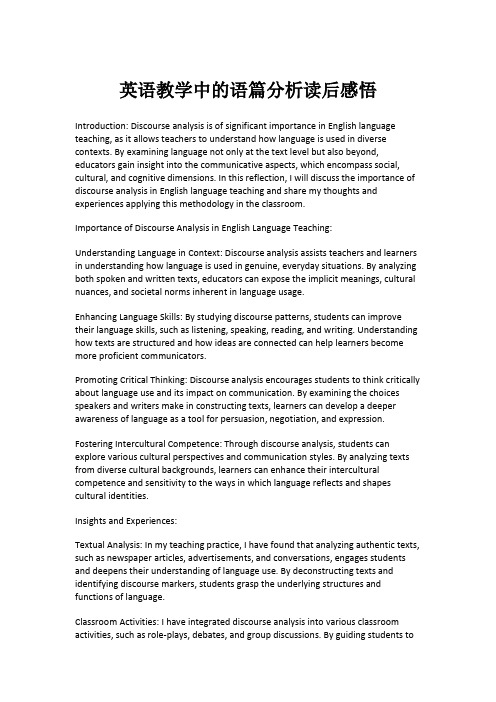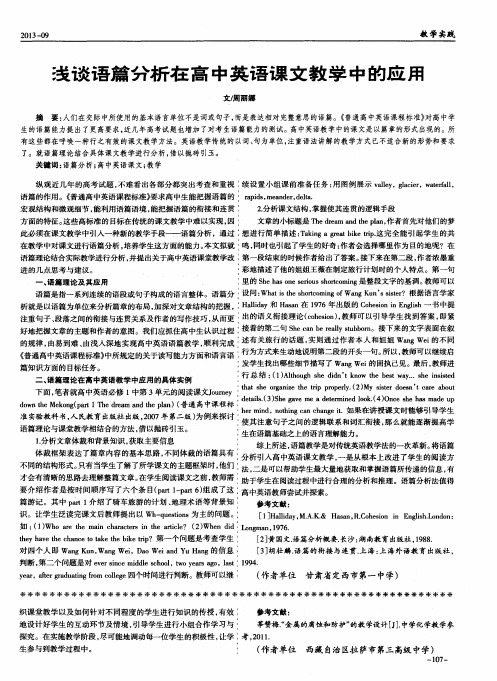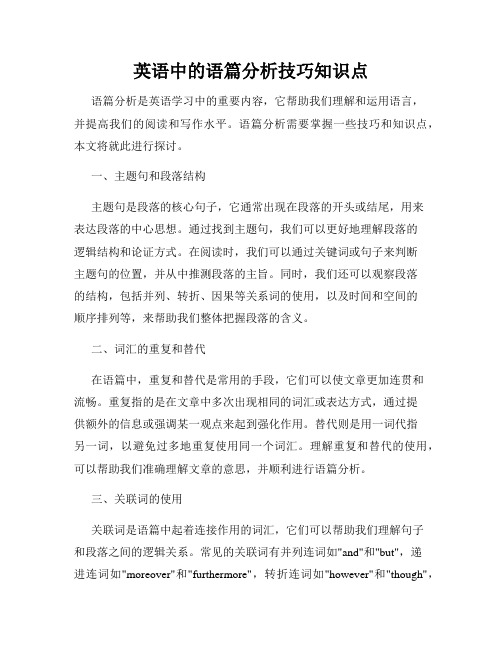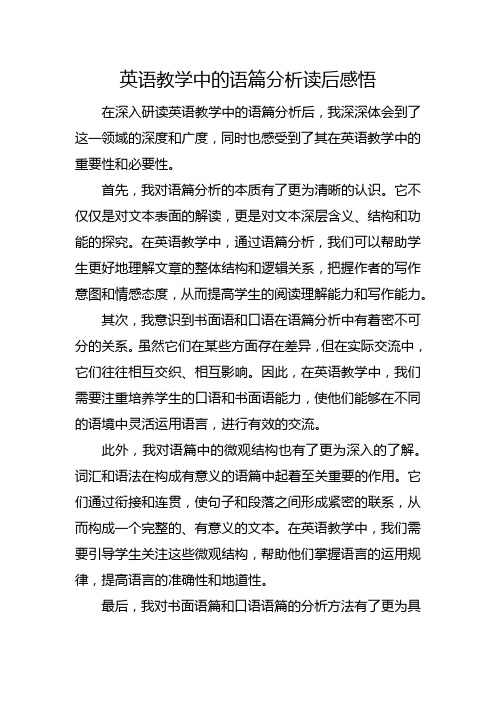英语会话的语篇分析浅谈
英语语篇教学中体裁分析可行性探讨

英语语篇教学中体裁分析可行性探讨在英语教学中,体裁分析是一项极为重要的内容。
体裁分析是指对于不同的语篇,我们需要分析其所属的体裁,并且根据不同体裁的特点来设计相关的教学活动,在培养学生英语语言能力的同时,也提高了学生英语思维和表达能力。
以下是对于英语语篇教学中体裁分析可行性的探讨。
首先,体裁分析可以提高学生英语阅读能力。
学生在阅读不同体裁的文章时,需要理解并识别不同的语言结构和语言表达方式。
例如,在阅读新闻报道时,学生需要理解新闻的标题、概要、主体内容和结论;而在阅读科技论文时,学生则需要理解各种专业术语和研究方法。
在体裁分析教学中,我们可以通过让学生识别和分析不同体裁中的语言结构和特点,提高学生英语阅读能力。
其次,体裁分析可以帮助学生提高英语写作能力。
不同体裁的写作风格和技巧也是不同的。
例如,在写作商业邮件时,要求简明扼要、语气客观,而在写作小说时,则可以更加随意自由。
在体裁分析教学中,我们可以通过让学生分析不同体裁中的写作要素,如段落结构、语言风格、表达技巧等,来帮助学生理解各种体裁的特点,在实践中提高学生的写作技能。
最后,体裁分析还可以促进学生跨文化交流。
不同的文化背景和语言习惯也会影响到不同体裁的表达方式。
例如,在中文环境下,偏爱用比喻和典故进行表达,而在英语环境下,则更加注重简洁和明确的表达方式。
在体裁分析教学中,我们可以引导学生理解并比较英语和中文的不同体裁,并提供多元化的文化视角,让学生更好地了解英语语言及其所在的文化背景,从而促进学生跨文化交流的能力。
综上所述,体裁分析在英语语篇教学中是非常可行的,并且对于提高学生的英语语言能力、写作技能和跨文化交流能力具有重要意义。
因此,在英语教学的过程中,我们应该加强对于体裁分析教学的关注,为学生提供更加丰富和有挑战性的学习体验。
大学英语语篇教学的分析与思考

容的段落篇章的层次人手 , 分析句子之间、 段落篇章之间的衔接和有关意义及逻辑思维的连贯性 , 帮助学生达
到最大量地获取和掌握文章所传递 的信息 , 有效地调动学生的学习主动性和积极性 , 同时逐步培养学生恰 当
地使用语言的能力 , 较好地掌握语言技能并应用语言, 不断提高和积累语言交际能力【 3 J 。
2 .有利于培养学生运用语言进行 交际的能力 教师不只是停 留在语言形式的训练上 , 要从语篇水平上组
织教学 , 这样有利于训练学生获取完整信息的基本功 , 同时 , 培养学生运用语 言材料表达 自己思想感情 的能
力, 把语言的运用和交际能力 的培养有机结合 , 逐步培养学生在语篇水平上进行交际的能力 。
学 生 的思维 能力 和创 造能 力 。 ( ) 篇教 学法 对学 生的 影 响 二 语
1 .不适应与恐惧感 语篇教学法强调学生的配合与参与 , 这势必要求学生有很好的语言基本功 , 不仅是 语法和词汇, 更重要的是表达和运用能力。但 由于我 国中学生在高中阶段 , 源于高考的压力 , 多数学生英语学 习的重点在于词汇和语法要点 , 对英语的表达和运用能力训练相对较少。这对刚入学的新生是一种挑战 , 面对
沈 阳农业大学学报( 社会科学版)2 0— 7 1( :6— 6 ,09 0 ,1 ) 4 4 6 44
Jun lo h n ag A r u ua U i ri (o ilS i c sE io ) 2 0 - 7 1 ()4 4 4 6 o ra fS e yn gi h rl nV sy S ca c n e dt n ,0 9 0 , 4:6 - 6 c e t e i l
种问题 , 势必影响他们的学习兴趣。
收稿 日期 : , 9 0 - 4 :0 — 2 2 20
英语教学中的语篇分析读后感悟

英语教学中的语篇分析读后感悟Introduction: Discourse analysis is of significant importance in English language teaching, as it allows teachers to understand how language is used in diverse contexts. By examining language not only at the text level but also beyond, educators gain insight into the communicative aspects, which encompass social, cultural, and cognitive dimensions. In this reflection, I will discuss the importance of discourse analysis in English language teaching and share my thoughts and experiences applying this methodology in the classroom.Importance of Discourse Analysis in English Language Teaching:Understanding Language in Context: Discourse analysis assists teachers and learners in understanding how language is used in genuine, everyday situations. By analyzing both spoken and written texts, educators can expose the implicit meanings, cultural nuances, and societal norms inherent in language usage.Enhancing Language Skills: By studying discourse patterns, students can improve their language skills, such as listening, speaking, reading, and writing. Understanding how texts are structured and how ideas are connected can help learners become more proficient communicators.Promoting Critical Thinking: Discourse analysis encourages students to think critically about language use and its impact on communication. By examining the choices speakers and writers make in constructing texts, learners can develop a deeper awareness of language as a tool for persuasion, negotiation, and expression. Fostering Intercultural Competence: Through discourse analysis, students can explore various cultural perspectives and communication styles. By analyzing texts from diverse cultural backgrounds, learners can enhance their intercultural competence and sensitivity to the ways in which language reflects and shapes cultural identities.Insights and Experiences:Textual Analysis: In my teaching practice, I have found that analyzing authentic texts, such as newspaper articles, advertisements, and conversations, engages students and deepens their understanding of language use. By deconstructing texts and identifying discourse markers, students grasp the underlying structures and functions of language.Classroom Activities: I have integrated discourse analysis into various classroom activities, such as role-plays, debates, and group discussions. By guiding students toanalyze language use in different contexts, I have observed an improvement in their language proficiency and critical thinking skills.Assessment Strategies: I have employed discourse analysis as an assessment method to evaluate students' language proficiency and analytical skills. By asking them to analyze and interpret texts, I assess their understanding, interpretation, and application of language in context.Conclusion: Discourse analysis is a valuable tool in English language teaching, enabling educators to explore language use in context, enhance language skills, promote critical thinking, and foster intercultural competence. By integrating discourse analysis into teaching practices, educators can empower students to become proficient communicators who can navigate the complexities of language and culture with confidence.。
浅谈语篇分析在高中英语课文教学中的应用

一
彩地 描述 了他 的姐姐王薇在制定旅 行计划时的个人特点 。第一句 里的 S h e h a s o n e s e i r o u s s h o r t c o m i n g 是整段文字 的基调 。 教师可以
、
语 篇 理 论 及 其 应 用
Wh a t i s t h e s h o t r c o mi n g o f Wa n g K u n ’ S s i s t e r ' . ?根据语 言学家 语篇是指一系列连续 的语段或句子构成 的语 言整 体。语篇分 设 问 : H a l l i d a y和 H a s a n在 1 9 7 6年 出版 的 C o h e s i o n i n E n g l i s h一 书中提 析就是 以语篇为单位来分 析篇 章的布局 , 加深对文章结构 的把 握 , c o h e s i o n ) , 教师 可 以引导学 生找到答案 , 即紧 注重句子 、 段落之间的衔接与连贯关系及作者的写作技巧 , 从而更 出的语义衔接理论 ( 接着 的第二句 S h e c a n b e r e a l l y s t u b b o r n 。接下来 的文字表面在叙 好地把握文章的 主题和作者 的意 图。我们应抓住高 中生认 识过程 实则通过 作者 本人和姐 姐 Wa n g We i 的不 同 的规律 , 由易 到难 、 由浅入深地 实现高 中英语 语篇教学 , 顺利 完成 述有 关旅行 的话题 , 行为方式来生动地说明第 二段 的开头一句 。 所以, 教师可以继续启 《 普通 高中英语课 程标准》 中所规定 的关 于读写能力方 面和语 言语 发学生找 出哪些细节描写了 Wa n g We i 的固执 己见。最后 , 教师进 篇知识方面 的 目标任务 。 行 总结 : ( 1 ) A l t h o u g h s h e d i d n ’ t k n o w he t b e s t w a y …s h e i n s i s t e d 二、 语篇 理论在 高中英语教学 中应用的具体 实例
英语教学中的语篇分析教学

立学习的 , 词语 的意义是在与其他 意义组合 中而存在 的 ; 且 而
掌握了句子结构未必就能 掌握 意义 和用 法 , 句子 的意 义不 是
一
个个词的意义累加起 来 的。解 决这 些问题 , 需要 我们 将 就
语篇意识 引入到英语 教学中 , 培养学生 的语 篇分析能力 , 文 本 就语篇的定义、 篇章结构分析 、 实践对语篇教学 的要 求 以及 在 教学中如何 实施 语篇教学等方面进行探讨。
逻辑联 系语 ( 连接词 ) 。不管采用何种分类 , 都大同小 异。
观点理论——定义理解——举 例说明 ;
观点理论— —阐述重要性—— 具体做法 ; 事物——优 点 ( 缺 点 ) 或 ——缺 点 ( 优 点 ) 或 ——结 论
看法 ;
代: 名词性替代 、 动词性替 代、 小句 性替代 等 ( 引语替 代 、 件 条
事物— —他人不 同观点——作 者用事实驳 斥— —作者 自 己的看 法 ;
人 物— — 成 就 贡 献 — — 成 长 背 景 — — 个 性 爱 好 。 二 、 篇 分 析 语
替代 、 情态替代等 )连接 : 、 ; 加合 转折 、 、 因果 时间 ; 详述 、 伸 、 延
增强等 ;2 词汇衔接手段 , 括重复 ( () 包 连续重复 和间 隔重 复 )
词、 短语 、 小句等 ; 同义词 , 反义词 ; 上下位词 ; 配。黄 国文 j 搭 在《 语篇分析概要》中把衔接 手段 分为 语法衔 接手 段 ( 应 、 照
事 物— — 发 展 过 程 — — 结 果 成 就 ;
的、 相互联系的语段 或句 子构成 的语 言整体 。语 篇不 论 以何
种形式出现 , 都应合 乎语 法、 衔接 自然 、 义 连贯 。衔 接和 连 语 贯是语篇分析的重要 手段 。衔 接是词 汇和语 法方 面 的手段 , 根据 H ldy&H sa a ia l asn的分类 , 衔接 手段可 细分为 : 1 语 法 () 衔接手段( 结构 和逻辑 的) 包括照应 : 照应、 , 人称 指示照应 、 比 照照应等 ; 省略 : 名词性省 略 、 动词 性省 略、 句性 省略 等 ; 小 替
英语中的语篇分析技巧知识点

英语中的语篇分析技巧知识点语篇分析是英语学习中的重要内容,它帮助我们理解和运用语言,并提高我们的阅读和写作水平。
语篇分析需要掌握一些技巧和知识点,本文将就此进行探讨。
一、主题句和段落结构主题句是段落的核心句子,它通常出现在段落的开头或结尾,用来表达段落的中心思想。
通过找到主题句,我们可以更好地理解段落的逻辑结构和论证方式。
在阅读时,我们可以通过关键词或句子来判断主题句的位置,并从中推测段落的主旨。
同时,我们还可以观察段落的结构,包括并列、转折、因果等关系词的使用,以及时间和空间的顺序排列等,来帮助我们整体把握段落的含义。
二、词汇的重复和替代在语篇中,重复和替代是常用的手段,它们可以使文章更加连贯和流畅。
重复指的是在文章中多次出现相同的词汇或表达方式,通过提供额外的信息或强调某一观点来起到强化作用。
替代则是用一词代指另一词,以避免过多地重复使用同一个词汇。
理解重复和替代的使用,可以帮助我们准确理解文章的意思,并顺利进行语篇分析。
三、关联词的使用关联词是语篇中起着连接作用的词汇,它们可以帮助我们理解句子和段落之间的逻辑关系。
常见的关联词有并列连词如"and"和"but",递进连词如"moreover"和"furthermore",转折连词如"however"和"though",因果关系词如"because"和"as a result"等。
通过学习和掌握这些关联词的用法,我们可以更好地理解作者的观点和论证思路。
四、句子结构的分析句子结构对理解语篇起着重要的作用。
英语中的句子结构多样且灵活,包括简单句、复合句、并列句和从句等。
在语篇分析中,我们需要分析句子的主谓宾结构、修饰语的使用和从句的引导词等。
通过分析句子的结构,我们可以更好地理解句子的含义和作者的意图。
英语教学中的语篇分析读后感悟

英语教学中的语篇分析读后感悟在深入研读英语教学中的语篇分析后,我深深体会到了这一领域的深度和广度,同时也感受到了其在英语教学中的重要性和必要性。
首先,我对语篇分析的本质有了更为清晰的认识。
它不仅仅是对文本表面的解读,更是对文本深层含义、结构和功能的探究。
在英语教学中,通过语篇分析,我们可以帮助学生更好地理解文章的整体结构和逻辑关系,把握作者的写作意图和情感态度,从而提高学生的阅读理解能力和写作能力。
其次,我意识到书面语和口语在语篇分析中有着密不可分的关系。
虽然它们在某些方面存在差异,但在实际交流中,它们往往相互交织、相互影响。
因此,在英语教学中,我们需要注重培养学生的口语和书面语能力,使他们能够在不同的语境中灵活运用语言,进行有效的交流。
此外,我对语篇中的微观结构也有了更为深入的了解。
词汇和语法在构成有意义的语篇中起着至关重要的作用。
它们通过衔接和连贯,使句子和段落之间形成紧密的联系,从而构成一个完整的、有意义的文本。
在英语教学中,我们需要引导学生关注这些微观结构,帮助他们掌握语言的运用规律,提高语言的准确性和地道性。
最后,我对书面语篇和口语语篇的分析方法有了更为具体的认识。
无论是分析书面语篇还是口语语篇,我们都需要关注其结构、功能、语境等方面。
在书面语篇分析中,我们需要关注其标记特征、小句的意义和分类等;在口语语篇分析中,我们需要关注其语用学理论的应用、话语分析和交际理论等。
这些方法为我们提供了有效的工具,帮助我们更深入地理解和分析不同类型的语篇。
总的来说,英语教学中的语篇分析为我提供了一个全新的视角来审视英语教学。
它让我意识到英语教学不仅仅是教授语言知识,更是培养学生综合运用语言进行交流和表达的能力。
因此,在未来的英语教学中,我将更加注重培养学生的语篇分析能力,帮助他们更好地理解和运用英语,实现有效的交流。
功能语篇分析对大学英语口语教学的启示

语篇体 裁根 据不 同的 目的体 现 出 篇分析方法从宏观和微观 的不 同层 面指导 篇构 建系统功能语法 的 目的就是为语篇分 的可见 ,
0● 00● 00 ● 00● 00● O 0● oo● 00 ●o 0● o0● oo ● oo● oo● oo ● o0◆ oo◆ o o● 00● oo ●0 0● o0◆ 00 ● 00● 00● 00 ● o0● o0● 00 ● o0● oO● 00● 00● oo● o0● 00 ● oo● 0o● 00● oo ● oo● oo● oo● 0o● oo● o0● oo ● oo● o0● o0 ● o
语 旨和语式 , 目的 , 它 角色扮演 。教师主要 围绕着这 四种形式 开 进行 口头交 际 的能力 。因此 , 本文 从实 践 语篇体裁 就是语 场 ,
的角度探讨如何运用功能语 篇分析指导大 解释 了交 际双方在具体的语境 中运用语言 展 口语教学 , 但却 忽视 了 口语语 篇 功能 的 学英 语 口语教学一功能语 篇分析与 口语语 的 目的以及他 们如何组织语言 以达到其 目 特征 。因此 , 借 助 于系统 功能语 言学 的语
s y s t e mi o t i c s ) 的观 点来 看 , 机融合 的关键 , 它 也是 培养学 生英语 口语 传统 的英 语 口语 教 学 主要 是 以教 师为 中 从 系统符 号学 (
心, 利用 以书面语 为基 础所 使用 的理想 化 语篇生成所 涉及的的系统分别位于三个符 应用能力 的主要途径之 一 。通常 , 教师作
教 学
系统语 言学认 为 , 语 篇 的构 建要 受到
作
者: 安徽 三联学 院; 安徽 , 合肥 , 2 3 0 6 0 1
- 1、下载文档前请自行甄别文档内容的完整性,平台不提供额外的编辑、内容补充、找答案等附加服务。
- 2、"仅部分预览"的文档,不可在线预览部分如存在完整性等问题,可反馈申请退款(可完整预览的文档不适用该条件!)。
- 3、如文档侵犯您的权益,请联系客服反馈,我们会尽快为您处理(人工客服工作时间:9:00-18:30)。
英语会话的语篇分析浅谈
[摘要]语篇分析是一门蓬勃发展的年轻学科,正逐渐成为当今语言学研究的主流,应用话语分析理论研究英语会话,可以了解人们怎样用语言来交际,分析会话中的话轮替换结构、会话中的毗邻应对,会话的主题、会话的开始语和结束语及会话中的修正问题对英语教学大有裨益。
[关键词]语篇分析话轮替换毗邻应对修正
现代语言学家认为每一种语言都是一种关系系统,确切地说是相互关系的系统总和,他们开始认识到对语言的研究不应局限在句子层面,不应只研究人为产生的句子,而应超越句子的范围,研究句子在语篇中的作用,研究用于实际交流的语言。
因此便产生许多语言分支,其中之一是语篇分析,其目的在于探讨人们怎样运用真实的语言。
会话是口头语言的最常见形式,对其进行系统的研究将为我们提供一些有益的启示。
一、会话中的话轮替换结构
话轮替换是指发话者和受话者不断交换所扮演的角色,即发话者变为受话者,受话者变为发话者。
会话中的会话者有一条潜在的自然遵守的规则;每次至少有一方,但又不多于一方在说话,如有多人或无人发话,便会有人来挽救局面。
正在讲话的人可运用多种方法来选择下一位说话人,他可以通过提问、请求等方式来选定下一个讲话人,由他人自己做出选择,也可以用一些非语言方法,如面部表情、声速、音高、手势等可以用来暗示下一个发言人,受话人一般有能力识别这些方法,并适当的接续上自己的应答。
这些技巧都可用于教学中。
在课堂上,教师可通过点名、提问、诱导式的话语来鼓励学生接受话轮。
学生接受话轮的意向也是进行教学评估的一种好方法。
接受话轮的快慢、意愿可表明学生对课堂知识的掌握情况及对所讲内容的感兴趣程度。
在学生回答完全之后,教师应马上“捡起”话轮,回应一些表扬、赞美的话。
这样将有助于增强学生的自信,促使他们和老师配合,积极地发言。
传统的课堂模式也应进行改革,打破原先老师统领课堂学生按序接受话轮的局面,更多增加了学生的自由讨论。
总之,对课堂的话轮体系规定限制越少,就越容易产生自然的话轮替换。
一次会话至少包括双方的一轮发话,一前一后的话段是邻接的,联系紧密并互为条件。
他们由会话的双方分别说出,如会话的一方先进行问候、提问、警告、威胁、道歉、抱怨、邀请等,另一方则根据情况作出合适的反应。
毗邻应对中存在着一些文化因素,如打招呼,在不同文化中,对其发生的场合、时间、用语都有不同的规定,学习者应注意这些文化差别,为每个始发语做出地道的、恰当的回答。
毗邻应对还可帮助语言学习者改变在和以英语为母语的人进行会话时的被动局面。
很多时候,他们只是一味的提供应答语,将会话的始发权都让给了别人。
掌握了毗邻应对的结构和特点之后,语言学习者应试着运用一些方法改变这种局面。
三、会话的主題,即会话中的核心事件
话题的选择是由参与者通过相互协商来实现的。
话题的选择至关重要,它应使会话中的每个人都感兴趣。
学习者应扩大知识面,努力为会话提供有趣的话题,好的话题能够使每个参与者发表见解,加入到谈话中来,学习者也应了解西方人避讳的话题,以免造成会话中的尴尬局面。
在教学过程中,教师在初始阶段应给学生一些供讨论的指定话题,随着词汇的增多,语法规则的掌握,学生可尝试一些自己的话题。
四、会话的开始语和结束语
它们随着会话的参与者和会话的场合而改变。
他们还受一些社会风俗的影响。
毗邻应对中的问候语经常用做会话的开场白,询问近来发生的事件也是开始会话的好方法:How arc you getting al-ong these days?征求对方对某件事的见解常见于会话的开始:What do you thinkofthe film?关于会话的结束有着很多固定的语言模式:Good bye!Give my bestregards to your parents.会话的结束是水到渠成、自然的过程,为了不显突兀,学习者应掌握一些技巧,它可以暗示自身的原因——“I have got to go”,也可从对方的角度找结束谈话的借口:Well,it istoo late,I do not want to keep you any Ion-ger.
自然的会话是一些不经事先准备的临时发生的过程,因此不可避免的存在着一些不尽人意之处,这就需要修正。
修正分为他人修正和自我修正。
学习者应学会一些请求修正的暗示方法,如目光从讲话人面部移开,重复未听懂的话,这样可以使他人更好的帮助自己纠正错误,从而有效的提高英语水平。
在不断改进过程中,也应注意避免错误的重复出现,从而使会话过程顺利畅达。
在课堂上教师可以通过重复、疑问等方式来指出学生的错误,可以让学生帮助修正,在学生感到不解时再由老师修正。
学习本身就是一个不断完善的过程,多种修正方法兼容并用才会达到理想的效果。
总之,会话分析是语言学中一个重要领域,随着科技的发展,国家间、团体间及个人间的交流不断增多,因此面对面的直接交流也就越发重要。
在这一领域将有更多的新发现和新理论产生,它们也将为教师在教学活动中提供一些有益的指导。
